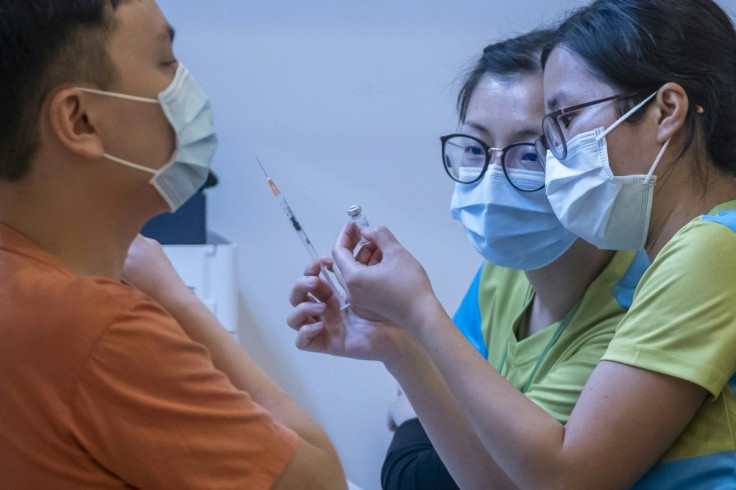Hong Kong, Macau Suspend Pfizer/BioNTech Vaccine Over Packaging Flaw
Hong Kong suspended the use of Pfizer/BioNTech's coronavirus vaccine on Wednesday after being informed some vials from a recent batch had "defective caps" -- although authorities said none of the problematic containers were used on residents.
The stoppage, which was also announced by neighbouring Macau, is the latest blow in efforts to role out mass vaccination programmes against a deadly virus that has killed more than 2.7 million people around the world and hammered the global economy.
Both Chinese cities said their decision came after they were contacted about the issue by Fosun, the Chinese pharmaceutical company that is distributing the Pfizer/BioNTech vaccine in China.
Some vials with the lot number 210102 were found to have defective caps, authorities said.
"The pharmaceutical company said they don't have any reason to believe that this batch of vaccines has safety risks," Hong Kong health chief Sophia Chan told reporters.
"The vaccines which we have found to have vial defects prior to injection were dumped. They were not used on residents," she added.
Many vaccines are shipped in concentrated form inside vials and are then diluted before being administered.
Bottles found to have problematic caps, cracks or other defects were dumped and therefore not used, Hong Kong officials said, adding they decided to suspend the programme out of an abundance of caution until their investigation is concluded.
Some Hong Kongers took to social media to say their appointments that day had been cancelled and that some vaccination centres were closed.
"I haven't lost confidence in the vaccine but I'm quite disappointed as I took the day off," one man, who gave his surname as Wong, told AFP as he arrived at a taped-off centre.
Hong Kong authorities said another batch of vaccines with lot number 210104 would be put to one side until the investigation is concluded.

The city had planned to administer second doses within 21 days of the first, but Pfizer's guidelines allow for a 42-day space between shots giving authorities more time to trace any issues.
Despite being a notoriously packed city, Hong Kong has kept infections low thanks to some of the most stringent quarantine measures in the world, recording just 11,000 infections and 200 deaths since the pandemic began.
Hong Kong began its vaccination drive last month but the public take-up has been slow and ensnared by roiling political unrest.
The city was upended by huge and often violent democracy protests in 2019 that Beijing has responded to with a sweeping crackdown on dissent.
As a result, public trust in Hong Kong's government is low.
A recent poll said only 37 percent of Hong Kong adults planned to get vaccinated.
As of Tuesday, 403,000 people -- about five percent of the city's population -- have had their first shot.
Authorities currently offer China's Sinovac and the Pfizer/BioNTech vaccine.
Sinovac received fast-track approval despite not publishing peer-reviewed clinical data.
The data available points to an efficacy rate of between 50-80 percent, depending on the studies.
Pfizer says its efficacy rate is 94-95 percent.
The vaccination scheme was opened to anyone above the age of 30 last week after officials struggled to attract enough elderly people and those in priority groups.
Hong Kong leader Carrie Lam has previously lamented the tepid enthusiasm for vaccination and accused critics of "smearing" the Chinese vaccine.
On Tuesday, health authorities banned a local clinic from supplying vaccines after one of its doctors publicly said he would choose Pfizer's vaccine over Sinovac.
© Copyright AFP 2024. All rights reserved.





















